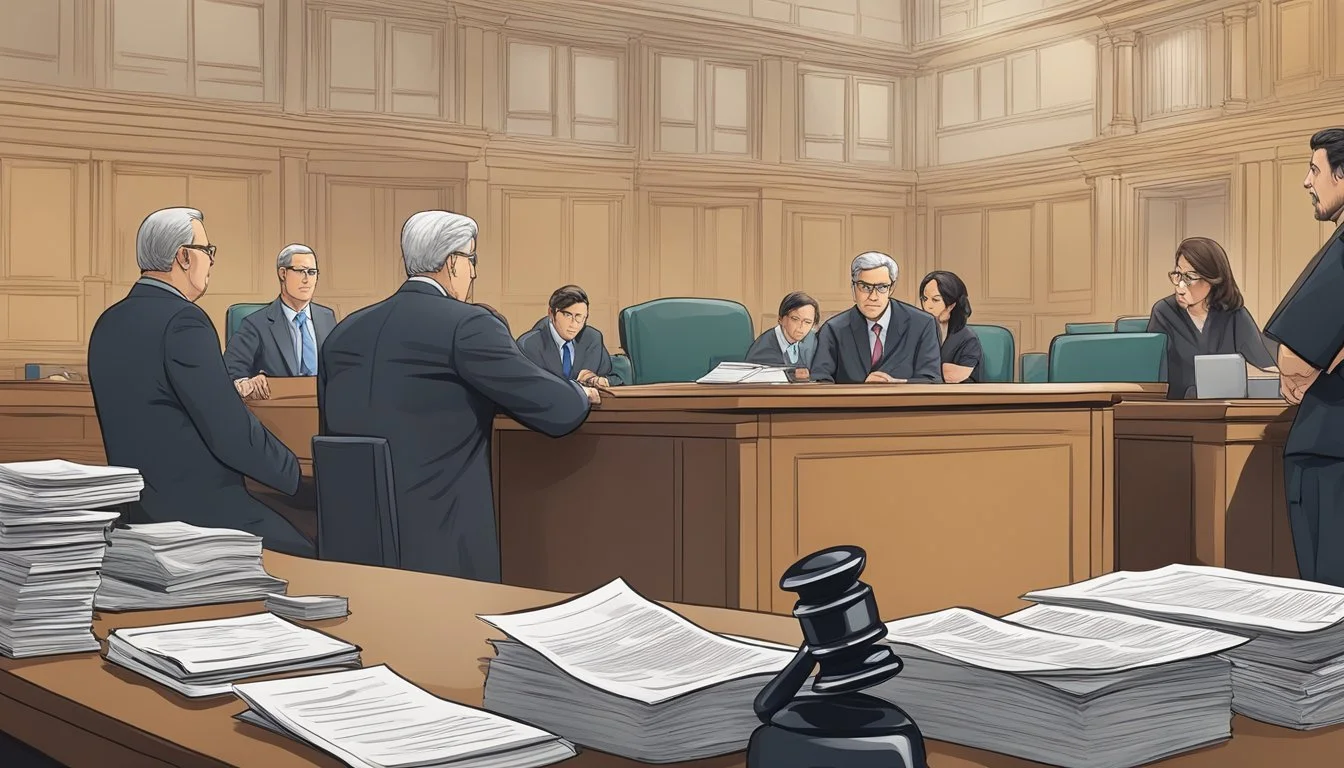Understanding Compensation for Trauma-Related Legal Claims
Post-traumatic stress disorder (PTSD) can have devastating effects on a person's life, often leading to legal action seeking compensation. PTSD settlements aim to provide financial support for those suffering from this debilitating condition. While settlement amounts vary widely, they typically range from $10,000 to $100,000, with some cases reaching higher figures.
The average PTSD settlement amount depends on several factors, including the severity of symptoms, impact on daily life, and economic losses incurred. Car accident-related PTSD settlements may range from $50,000 to $150,000, while workplace incidents or military service-related trauma could result in different amounts. Factors such as medical bills, therapy expenses, lost wages, and the long-term effects on the individual's quality of life all play a role in determining the final settlement value.
Proving PTSD in a legal context can be challenging due to its psychological nature. Documentation of symptoms, expert testimony, and evidence of economic damages are crucial in building a strong case. Each PTSD claim is unique, and settlement amounts reflect the specific circumstances and impact of the condition on the individual's life.
Understanding PTSD and Settlements
Post-traumatic stress disorder (PTSD) can profoundly impact a person's life, often leading to legal claims for compensation. Recognition of PTSD in legal contexts has grown, influencing settlement processes and outcomes.
Definition and Symptoms of PTSD
PTSD is a mental health condition triggered by experiencing or witnessing a traumatic event. Common symptoms include:
Intrusive memories or flashbacks
Nightmares related to the trauma
Severe anxiety and hypervigilance
Avoidance of trauma-related stimuli
Negative changes in mood and cognition
These symptoms can significantly disrupt daily life, affecting work, relationships, and overall well-being. Diagnosis typically requires symptoms to persist for more than a month and cause notable distress or functional impairment.
The Importance of Recognizing PTSD in Legal Context
Recognizing PTSD in legal settings is crucial for fair compensation. Courts now acknowledge the serious impact of this condition on a person's life and ability to work. Key considerations include:
Severity of symptoms and their effect on daily functioning
Duration of the condition and long-term prognosis
Impact on earning capacity and career prospects
Costs of ongoing mental health treatment
Legal representatives often work with mental health professionals to document the extent of PTSD and its consequences. This evidence helps establish the validity of claims and supports fair settlement negotiations.
Factors Influencing PTSD Settlements
Several key elements determine the amount awarded in PTSD settlements. These factors impact the overall compensation and vary based on individual circumstances and the strength of the case.
Severity and Impact on Quality of Life
The severity of PTSD symptoms plays a crucial role in settlement amounts. More intense symptoms that significantly disrupt daily activities often lead to higher compensation. Lost wages due to inability to work or reduced work capacity are factored into settlements.
Pain and suffering damages account for emotional distress and decreased quality of life. Settlements consider how PTSD affects relationships, hobbies, and overall well-being. Persistent nightmares, anxiety, or social isolation can increase settlement values.
Insurance policy limits may cap potential payouts, regardless of symptom severity or impact.
Evidence and Documentation
Strong evidence is essential for maximizing PTSD settlements. Medical records from mental health professionals documenting diagnosis, treatment, and prognosis are crucial. Detailed accounts of symptom progression and their effects on daily life strengthen claims.
Expert testimony from psychologists or psychiatrists can provide professional opinions on the extent of PTSD and its long-term implications. This carries significant weight in settlement negotiations.
Personal diaries, witness statements, and employment records can further support claims by demonstrating real-world impacts of PTSD.
Role of Legal Assistance
Experienced personal injury attorneys specializing in PTSD cases can significantly influence settlement outcomes. They help gather and present compelling evidence, negotiate with insurance companies, and accurately value claims.
Lawyers can identify all potential sources of compensation, including additional insurance policies or liable parties. They ensure all aspects of PTSD-related damages are considered, from medical expenses to future care needs.
Legal representation often leads to higher settlements by leveraging knowledge of precedent cases and understanding fair compensation ranges for similar PTSD claims.
Types of Compensation in PTSD Settlements
PTSD settlements typically involve several categories of compensation to address the various impacts on a victim's life. These aim to cover tangible financial losses as well as intangible suffering.
Economic Damages
Economic damages compensate for quantifiable financial losses resulting from PTSD. These include medical expenses for therapy sessions, psychiatric care, and medication. Costs for ongoing treatment and future medical needs are also considered.
Lost income is another key component. This covers wages lost due to inability to work or reduced earning capacity. It may include both past and future income losses if PTSD affects long-term career prospects.
Other economic damages may encompass:
Travel expenses for medical appointments
Costs of hiring help for daily tasks
Expenses for adaptive equipment or home modifications
Non-Economic Damages
Non-economic damages address the intangible effects of PTSD on a person's life. These are more challenging to quantify but are crucial for comprehensive compensation.
Pain and suffering is a primary category. It covers physical discomfort and emotional distress caused by PTSD symptoms. Anxiety, depression, and sleep disturbances fall under this umbrella.
Loss of enjoyment of life is another important factor. PTSD can severely impact a person's ability to engage in hobbies, maintain relationships, or find pleasure in daily activities.
Other non-economic damages may include:
Emotional distress
Mental anguish
Loss of consortium (impact on marital relationships)
Punitive Damages and Their Role
Punitive damages are less common in PTSD settlements but may apply in cases of extreme negligence or intentional harm. These are not meant to compensate the victim but to punish the wrongdoer and deter similar behavior.
Courts may award punitive damages if:
The defendant's actions were particularly reckless
There was intentional infliction of emotional distress
The conduct was egregious or malicious
The amount of punitive damages varies widely. It often depends on the defendant's financial resources and the severity of their conduct. Some states cap punitive damages or tie them to compensatory damages.
PTSD Settlement Amounts and Determining Factors
PTSD settlements vary widely based on case-specific factors. Financial compensation depends on the severity of symptoms, impact on daily life, and available insurance coverage.
Understanding Average Settlement Amounts
PTSD settlement amounts typically range from $10,000 to $100,000. Some cases may result in higher payouts, with an average around $974,663 and a median of $125,000. These figures reflect the wide variation in compensation.
Factors influencing settlement amounts include:
Severity of PTSD symptoms
Impact on work capacity and daily activities
Total medical expenses
Pain and suffering
Insurance policy limits often play a crucial role in determining the maximum available compensation.
Adjustments Based on Individual Cases
Each PTSD case is unique, requiring careful evaluation. The settlement amount may be adjusted based on:
Extent of negligence by the defending party
Long-term prognosis and ongoing treatment needs
Loss of income or earning capacity
Evidence supporting the PTSD diagnosis
Personal injury claims involving PTSD can be complex due to the mental health component. Strong documentation from mental health professionals is crucial for proving symptoms and their impact.
Role of Insurance Companies
Insurance companies significantly influence PTSD settlements. They often:
Assess the strength of the claim
Evaluate medical evidence and expert opinions
Consider policy limits when determining payouts
Negotiations with insurers can impact the final settlement amount. They may initially offer lower amounts, requiring skilled negotiation to reach a fair settlement.
Insurance policy terms and coverage limits can set boundaries on potential compensation. Some policies may have specific provisions for mental health claims, affecting the settlement process.
Case Studies and Examples
PTSD settlements vary widely based on individual circumstances. Examining real-life cases provides insight into compensation amounts and factors influencing outcomes across different situations.
War and Combat Veterans
Combat veterans often face severe PTSD symptoms, leading to substantial settlements. In one notable case, a Marine Corps veteran received $3.2 million after developing PTSD from multiple tours in Iraq and Afghanistan. The settlement covered ongoing medical treatment, therapy, and lost wages.
Another example involved an Army veteran awarded $1.8 million for PTSD resulting from a traumatic incident during deployment. The case highlighted the importance of expert testimony in establishing the long-term impact of psychological trauma on daily functioning and earning capacity.
Veterans' PTSD settlements typically consider factors such as:
Severity of symptoms
Impact on employment
Need for ongoing treatment
Quality of life changes
Accidents and Workplace Incidents
PTSD settlements in accident and workplace cases often depend on the incident's severity and resulting psychological impact. A construction worker received a $950,000 settlement after developing PTSD from a near-fatal fall. The case emphasized the intersection of physical and psychological injuries in determining compensation.
In an auto accident case, a plaintiff was awarded $750,000 for PTSD stemming from a multi-car pileup. The settlement accounted for therapy costs, lost wages, and diminished quality of life.
Workers' compensation PTSD settlements vary by state and industry. A firefighter obtained a $625,000 settlement for PTSD developed after responding to a particularly traumatic emergency call. The case underscored the unique risks faced by first responders and the need for comprehensive mental health coverage.
Assault and Violent Incidents
PTSD settlements resulting from assaults or violent incidents often involve both criminal and civil proceedings. In a robbery case, a store clerk received a $500,000 settlement for PTSD developed after being held at gunpoint. The settlement covered therapy costs, lost wages, and pain and suffering.
A domestic violence survivor was awarded $850,000 in a civil suit against her abuser. The settlement accounted for years of psychological trauma, ongoing therapy needs, and the impact on her career and personal relationships.
Factors influencing PTSD settlements in violent incident cases include:
Severity of the attack
Duration of abuse (in domestic cases)
Physical injuries accompanying psychological trauma
Impact on victim's daily life and relationships
Navigating the Legal Process
Filing a PTSD claim and negotiating a settlement involves several key steps. Understanding these processes can help victims seek fair compensation for their trauma.
Filing a PTSD Claim
To initiate a PTSD claim, victims must gather evidence of their condition and its impact on their life. This includes medical records, therapy notes, and statements from family or coworkers.
A detailed account of the traumatic event is crucial. Victims should document how PTSD symptoms affect their daily activities and work performance.
Timely filing is essential, as statutes of limitations vary by jurisdiction. Submitting a claim promptly ensures victims preserve their right to seek compensation.
The Role of an Attorney in PTSD Cases
An experienced personal injury attorney specializing in PTSD cases can significantly improve outcomes. They guide victims through complex legal procedures and protect their rights.
Attorneys help gather and present compelling evidence. They work with medical experts to establish the severity of PTSD and its long-term effects.
Legal representation is vital during negotiations with insurance companies or opposing counsel. Attorneys advocate for fair compensation, considering all aspects of the victim's suffering.
Settlement Negotiation Strategies
Effective negotiation starts with a clear understanding of the claim's value. Attorneys calculate damages, including medical costs, lost wages, and pain and suffering.
Presenting a strong case backed by solid evidence is key. This may involve expert testimonies and demonstrative exhibits illustrating the impact of PTSD.
Patience is crucial in negotiations. Initial offers are often low, and counteroffers may be necessary. Attorneys advise clients on when to accept or reject settlement offers.
If negotiations stall, attorneys may recommend alternative dispute resolution methods or proceeding to trial. The goal is to secure a fair settlement that adequately compensates the victim for their trauma.
Support and Recovery
PTSD recovery involves comprehensive mental health support, victim assistance beyond financial settlements, and ongoing management strategies. These elements work together to help individuals reclaim their lives and improve overall well-being.
Therapy and Mental Health Support
Effective PTSD treatment often includes therapy and mental health support. Cognitive Behavioral Therapy (CBT) and Eye Movement Desensitization and Reprocessing (EMDR) are two evidence-based approaches. These therapies help patients process traumatic experiences and develop coping mechanisms.
Mental health professionals may also prescribe medications to manage symptoms. Antidepressants, anti-anxiety medications, and sleep aids can provide relief. Regular sessions with therapists or counselors are crucial for monitoring progress and adjusting treatment plans as needed.
Group therapy offers a supportive environment where individuals can connect with others facing similar challenges. This shared experience can reduce feelings of isolation and promote healing.
Supporting Victims Beyond Financial Settlement
Financial compensation is just one aspect of supporting PTSD victims. Many require additional assistance to rebuild their lives. Vocational rehabilitation programs can help individuals re-enter the workforce or find new career paths suited to their current capabilities.
Support groups provide a sense of community and understanding. These groups offer practical advice, emotional support, and a safe space to share experiences. Family therapy can also be beneficial, helping loved ones understand PTSD and improve communication.
Legal advocacy services can guide victims through complex legal processes related to their PTSD claims. This support ensures fair treatment and access to necessary resources.
Ongoing PTSD Management
Managing chronic PTSD requires long-term strategies. Patients often benefit from developing personalized coping techniques. These may include mindfulness practices, stress-reduction exercises, and healthy lifestyle habits.
Regular check-ins with mental health professionals help track progress and address new challenges. Some individuals find alternative therapies like art therapy or equine therapy helpful in their ongoing recovery.
Self-care plays a vital role in PTSD management. This includes maintaining a balanced diet, getting regular exercise, and ensuring adequate sleep. Building a strong support network of friends, family, and professionals contributes to long-term stability and improved quality of life.






